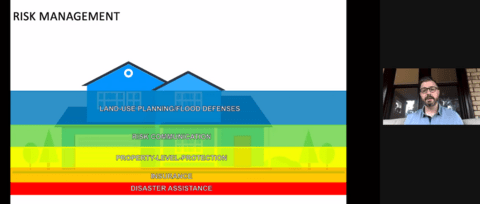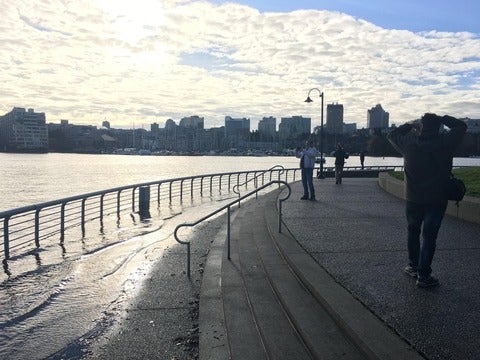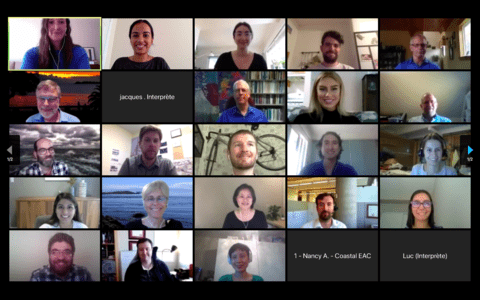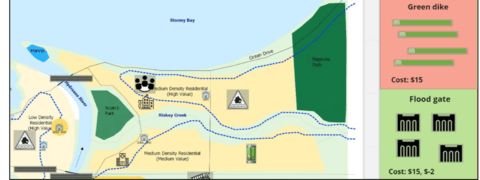The Canadian Coastal Resilience Forum (CCRF) is a community of practice focused on strengthening resilience to climate change and hazards in Canada’s coastal regions.

Natural hazards pose a serious threat to public safety, livelihoods and local economies in coastal regions. For example, heavy rainfall, storm surges, and river floods can have costly impacts on social, economic, environmental and cultural assets.
The CCRF was established to facilitate knowledge-sharing across sectors, institutions and disciplines and to identify policy and governance strategies for reducing and managing the consequences of natural hazards in coastal areas, such as:
- Clarifying the roles and responsibilities across government levels, for-profit and non-profit organizations and the public in risk prevention, reduction and disaster recovery
- Identifying policies in place that promote (rather than prevent and discourage) rebuilding in risky areas after disasters occur (e.g., floods)
- Locating exposed and vulnerable populations and achievable measures of self-protection and risk reduction
This initiative is kindly supported by the Marine Environmental Observation, Prediction and Response Network (MEOPAR)—a federally-funded Network of Centres of Excellence.

News
Mobilizing knowledge on climate change and water security: University of Waterloo’s Water Institute & IC3 host interdisciplinary summer school
As climate change continues to threaten urban and rural communities, water security challenges driven by urbanization will exacerbate existing vulnerabilities. Tackling these ‘wicked’ problems necessitates collaboration across sectors, the integration of nature-based solutions and the exploration of synergies that prioritizes long term climate adaptation. Promoting water security in urban centres can help to improve social equity and increase access to water resources to foster more resilient communities in the face of climate change.
Living with Water: Exploring solutions to address coastal climate change in British Columbia
The Living with Water Theme Partnership is a four year, $1 million project funded by the Pacific Institute for Climate Solution (PICS) that supports research into complex and critically important climate mitigation and adaptation challenges along the South Coast of British Columbia (BC), which includes 20+ Vancouver area municipalities, the Fraser River Delta, Burrard Inlet and Squamish Delta. The goal of the project is to develop new planning and design frameworks and decision-making tools to help communities and ecosystems successfully adapt to the impacts of sea level rise, coastal/riverine flooding and shoreline erosion.
Recap on MEOPAR’s Virtual Research Conferences: National Forum on Coastal Community Resilience and the Annual Scientific & Training Meeting
In late September, MEOPAR’s Response Core hosted an interactive virtual National Forum on Coastal Community Resilience: Local Government Initiatives to Address Sea-Level Rise and Coastal Flooding. The forum offered a unique opportunity to connect, share and learn about coastal adaptation approaches for Canada’s coastal municipalities and communities.
Blog
Researcher Spotlight Series: Critical Infrastructure Resilience in a Changing Climate
Sandra Biskupovic, PhD student at the University of Waterloo, is researching the complex topic of critical infrastructure resilience in the context of climate change. Sandra is interested in identifying and establishing effective multi-level governance arrangements which would effectively reduce the societal impacts which occur when critical infrastructure is disrupted because of extreme weather and natural disasters.
Researcher Spotlight Series: Play your way to preparedness - Enhancing collective decision-making on flood risk management through a serious game
The Flood Resilience Challenge © serious game is continuing to pick up momentum even after Dr. Evalyna Bogdan completed her postdoctoral fellowship at the University of Waterloo (2019-2021). The goal of the FRC game is to strengthen stakeholder capacity for collective decision-making and was part of Dr. Bogdan’s postdoctoral research on Building Capacity for Difficult Conversations on Flood Risk Management in Canada’s Communities.
Researcher Spotlight Series: Exploring the use of property buyouts as a climate change adaptation tool
Shaieree Cottar is a PhD Student in the department of Geography and Environmental Management. She is researching the emergent role of property buyouts as a climate adaptation tool in Canadian municipalities. Her work intersects the areas of climate policy, disaster risk reduction and managed retreat.






